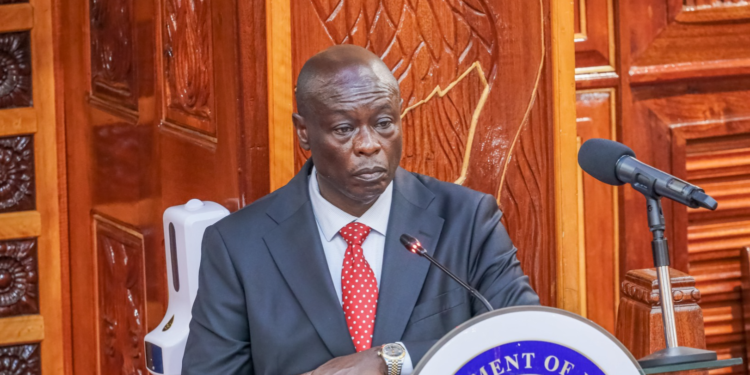Deputy President Rigathi Gachagua has been impeached by the Kenyan Senate in a historic vote that has pushed the country’s constitutional framework to its limits. The decision came after a day of high political theatre that saw Gachagua hospitalized and his legal team withdraw from proceedings, raising questions about due process and the interpretation of Kenya’s 2010 constitution.
After the first round of voting, 53 senators supported Gachagua’s impeachment, with 13 opposing. The charges against him involved undermining national unity.
In the second round, where he faced accusations of undermining the president, 28 senators voted in favor, while 39 voted against.
| Ground | Description | Ayes | Nays | Abstentions |
|---|---|---|---|---|
| 1 | Gross violation of Articles 10 (2)(a), (b), (c), 27 (4), 73 (1)(a), (2)(b), 75 (1)(c), 129 (2), 147 (1), 131 (2)(c), and (d) | 53 | 13 | 0 |
| 2 | Violation of Articles 147 (1) and 152 (1) by undermining the President and Cabinet | 28 | 39 | 0 |
| 3 | Undermining devolution (Articles 6 (2), 10 (2)(a), 174, 186 (1), 189 (1), Fourth Schedule) | 19 | 45 | 3 |
| 4 | Violation of Article 160 (1) on the independence of judges | 51 | 16 | 0 |
| 5 | Violation of Articles 3 (1) and 148 (5)(a) regarding Oath of Office | 49 | 16 | 2 |
| 6 | Committing crimes under National Cohesion and Integration Act | 48 | 18 | 1 |
| 7 | Committing gross economic crimes under Anti-Corruption and Economic Crimes Act and Proceeds of Crime Act | 13 | 53 | 1 |
| 8 | Making false, malicious, and inciteful public remarks (Penal Code, Leadership and Integrity Act) | 27 | 40 | 0 |
| 9 | Misconduct by undermining the National Security Intelligence Service | 46 | 20 | 1 |
| 10 | Open insubordination of the President | 22 | 44 | 0 |
| 11 | Bullying state and public officers | 17 | 41 | 2 |
Under the law, the impeachment required only a single charge to proceed, provided at least 45 senators were in favor. Gachagua had been charged on eleven grounds.
The impeachment, which marks the first time a sitting deputy president has been removed from office in Kenya’s history, has sparked intense debate among legal experts and politicians about the proper application of constitutional provisions regarding impeachment proceedings.
The day’s events unfolded in a series of unexpected twists, beginning with cross-examinations and witness submissions in the morning. The Senate broke for recess at 1:15 pm, with expectations high for Gachagua’s appearance on the witness stand upon resumption at 2:30 pm.
However, when the session reconvened, Gachagua was conspicuously absent. His lawyer, Paul Muite, informed the Senate that the deputy president had been rushed to hospital shortly before his scheduled appearance. Senate Speaker Amason Kingi responded by suspending proceedings until 5 pm, allowing time for Gachagua to potentially recover and testify.
As the 5 pm deadline approached, Muite announced that Gachagua had been admitted to Karen Hospital with intense chest pains and had been advised by doctors to rest. The lawyer urged the Senate to adjourn the motion until Tuesday, citing Article 145(6)(b) of the constitution, which guarantees the right of the accused to be heard.
This request was met with resistance from the National Assembly’s legal team, who argued that health issues could not be timed and that a fair hearing did not necessarily require oral testimony. They proposed proceeding with their submissions without cross-examining Gachagua.
After a brief suspension, Speaker Kingi directed the issuance of a supplementary order paper, allowing senators to vote on whether to designate Saturday as the final day for hearing the impeachment motion. The Senate overwhelmingly rejected the motion to adjourn, opting instead to continue with the proceedings.
This decision prompted Gachagua’s legal team to withdraw from the session, citing a lack of instructions from their client. The National Assembly’s team then presented their submissions for an hour, after which senators voted on a special motion to impeach the deputy president.
The day’s events have sparked a fierce debate among legal experts. Prominent lawyer Ahmednasir Abdullahi warned that the Speaker “Must adjourn the proceedings to next week” to avoid falling into what he described as “the elaborate trap laid by the defence.”
Ekuru Aukot, who was involved in drafting the 2010 constitution, criticised the proceedings, stating, “The rushed Rigathi Gachagua impeachment gives the false impression that Kenya is in a state of emergency.” He further argued that Article 145(5) of the constitution mandates that the accused “shall have the right to appear and be represented.”
However, lawyer Steve Ogolla offered a different perspective, suggesting that “DP Gachagua’s Legal Team has made a tactical error. By walking out of Senate proceedings, they lose the right to audit the process on the merit.”
With Gachagua likely to challenge the legality of the proceedings, and the government facing the task of appointing a new deputy president, Kenya finds itself at a critical juncture. The coming days and weeks will test the resilience of the country’s democratic institutions and the strength of its constitutional framework.


















